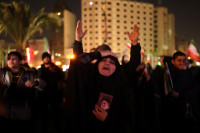World
Why Nobel experts aren’t betting on Trump for this year’s Peace Prize
Many have lobbied to win the Nobel Peace Prize, but no one has done it more intensely than Trump.
Reuters
US President Donald Trump will not win the Nobel Peace Prize, opens new tab he so covets as he is dismantling the international world order the award committee cherishes, according to experts.
His lobbying is likely to be counterproductive too. The award-giving committee prefers to work independently, one of its members told Reuters, sheltering from outside pressures.
Instead, the five-strong body may wish to highlight a humanitarian organisation working in an environment that has become more challenging partly due to Trump's US aid cuts. The announcement is on October 10.
This could mean an award for the UN refugee agency, UNHCR, the UN children's agency, UNICEF, the Red Cross, Doctors Without Borders, or a local grassroots group such as Sudan's Emergency Response Rooms, among others.
"He has no chance to get the Peace Prize at all," said Asle Sveen, a historian of the award, citing Trump's support for Israel in the war in Gaza and his attempts at rapprochement with Russian President Vladimir Putin, among the reasons.
Alfred Nobel's will, the award's foundation, says the award should go to the person "who has done the most or best to advance fellowship among nations".
That is something Trump is not doing, according to Nina Graeger, director of the Peace Research Institute Oslo.
"He has withdrawn the US from the World Health Organization and from the Paris Accord on climate, he has initiated a trade war on old friends and allies," she told Reuters.
"That is not exactly what we think about when we think about a peaceful president or someone who really is interested in promoting peace."
UNLIKELY NOBEL PEACE PRIZE LAUREATES
To be sure, many surprising candidates have won the Nobel Peace Prize in the past - Barack Obama less than eight months after he became US President or US National Security Adviser Henry Kissinger at the height of the Vietnam War.
"Sometimes people have received the Peace Prize in spite of a brutal record, an authoritarian record, a background where they've contributed to evil, or at least wrongdoing," said Henrik Syse, a former member of the Norwegian Nobel Committee.
"But they had explicitly seen the things that they had contributed to were wrong, and therefore took the steps necessary to correct these wrongs," he said, citing the example of FW de Klerk, the last apartheid-era leader of South Africa, who won the prize jointly with Nelson Mandela in 1993.
Should Trump be able to put pressure on Putin to end the war in Ukraine or on Israeli leader Benjamin Netanyahu to stop the war in Gaza, he could well be discussed as a possible candidate, Graeger said.
AN INTENSE LOBBYING CAMPAIGN
Many have lobbied to win the Nobel Peace Prize, but no one has done it more intensely than Trump. He has used his platform as US president repeatedly to argue he should win the award, including when addressing the UN General Assembly on Tuesday.
But lobbying is generally counterproductive, according to the deputy leader of the present Norwegian Nobel Committee.
"These types of influence campaigns have a rather more negative effect than a positive one. Because we talk about it on the committee. Some candidates push for it really hard and we do not like it," Asle Toje said. He was speaking generally about lobbying and not about any particular candidate.
"We are used to work in a locked room without being attempted to be influenced. It is hard enough as it is to reach an agreement among ourselves, without having more people trying to influence us," he added, with a smile.
For the current committee's leader, the attention does not impact the work.
"All politicians want to win the Nobel Peace Prize," Joergen Watne Frydnes told Reuters.
"We hope the ideals underpinned by the Nobel Peace Prize are something that all political leaders should strive for ... We notice the attention, both in the United States and around the world, but outside from that, we work just the same way as we always do."
WHO COULD WIN INSTEAD?
Aside from a humanitarian organisation, the committee could also highlight UN institutions such as the International Court of Justice, or the UN as a whole, which is marking its 80th anniversary this year.
It could also put the spotlight on journalists, following a year when more media workers than ever before were killed reporting the news, most of them in Gaza. If so, the committee could reward the Committee to Protect Journalists or Reporters Without Borders.
It could also highlight local mediators negotiating ceasefires and access to aid in conflicts, such as peace committees in the Central African Republic, the West Africa Network for Peacebuilding or the Elders and Mediation Committee in El Fasher, Darfur.
"Any of these would be deserving of the award," said Karim Haggag, head of the Stockholm International Peace Research Institute.
****************************************************************************
HED: China leads nations with new climate plans, defying US climate denial
DEK: China’s reduction target marked the first time the world’s biggest emitter pledged a cut in emissions.
Solar panels lie in front of factories at Jinjie Industrial Park in Shenmu, Shaanxi province, China November 20, 2023.
REUTERS
Sept 24
China led several countries in announcing new climate plans on Wednesday and offered a veiled rebuke of the US president’s anti-climate rhetoric a day earlier at the UN General Assembly.
Addressing a climate leaders’ summit hosted by UN Secretary-General Antonio Guterres, Chinese President Xi Jinping said in a live video message from Beijing that by 2035 his country would cut its greenhouse gas emissions by 7%-10% from its peak.
In addition, Xi said China planned to increase its wind and solar power capacity by six times from its 2020 levels within the next 10 years – helping to boost its share of non-fossil fuels in domestic energy consumption to over 30%.
China's reduction target marked the first time the world's biggest emitter pledged a cut in emissions, rather than just limiting their growth, though the reduction was less than many observers had expected.
Xi urged stronger climate action from the world's developed countries. He referred, though not by name, to the United States for moving away from the goals of the Paris Agreement on climate change.
"Green and low-carbon transformation is the trend of our times.
Despite some countries going against the trend, the international community should stay on the right track, maintain unwavering confidence, unwavering action, and undiminished efforts," Xi said.
On Tuesday, US President Donald Trump used his UN General Assembly speech to blast climate change as a "con job", to call scientists “stupid” and to criticize EU member states and China for embracing clean energy technologies.
Trump ordered a second withdrawal by Washington from the 10-year-old Paris treaty, which aimed to prevent global temperatures from rising beyond 1.5 degrees Celsius through national climate plans. The US is the world's biggest historical greenhouse gas emitter and second biggest current emitter behind China.
Ian Bremmer, a political scientist with the Belfer Center, said Trump's climate denial speech had effectively ceded the market for post-carbon energy to the Chinese.
"Trump wants fossil fuels and the United States is indeed a powerful petro-state,” Bremmer said. “But letting China become the world’s sole powerful electro-state is the opposite of making America great again … at least if you care about the future.”
Observers had been hoping that China would seize on the US retreat as a moment to announce a reduction target of at least 30% to stay in line with its past goal of net-zero emissions by 2060.
Li Shuo, director of the China Climate Hub at the Asia Society, said China's announcement was underwhelming in light of its rapid production of renewable energy and electric vehicles.
"Beijing's commitment represents a cautious move that extends a long-standing political tradition of prioritizing steady, predictable decision-making but also hides a more significant economic reality," he said.
Li noted, however, that China's dominance in green technology and Washington's retreat could push China toward a more proactive role on the global stage.
WORLD IS STILL SHORT ON AMBITION
Despite pressure for significant new climate commitments ahead of this year’s COP30 summit in Brazil, Wednesday’s announcements failed to impress.
Environmental groups and observers said pledges by some of the world's biggest economies fell well short of where they should be in emissions reductions, given the rapidly worsening impacts of climate change.
Brazilian President Luis Inacio Lula da Silva warned that countries’ commitments made ahead of the UN climate summit in November would show the world "whether or not we believe in what the science is showing us."
Brazil has committed to reducing emissions by 59%-67% by 2035 and to stepping up efforts to combat deforestation.
"Society is going to stop believing its leaders," Lula said. "And all of us will lose because denialism may actually win."
Guterres, who hosted the summit on the sidelines of the UN General Assembly, assured that the world was making progress in the energy transition, even if it was slow.
"The Paris Agreement has made a difference," Guterres said in prepared remarks, noting that actions taken under the 2015 treaty had lowered the projected rise in the average global temperature to from 4 degrees C to 2.6 degrees C.
That’s still far from the treaty’s stated goal of holding to 1.5 degrees C Already the world has warmed more than 1.2 degrees C from the preindustrial average.
"Now, we need new plans for 2035 that go much further, much faster," Guterres said.
The European Union has not yet reached agreement on its new UN-mandated climate target, instead drafting plans to submit a temporary goal, which could change.
EU President Ursula Van der Leyen told the summit the EU was on track to reach its 2030 target of slashing emissions 55% by 2030, and the bloc’s 2035 reduction goal would range between 66% and 72%.
Australia, which plans to host a 2026 UN climate summit, announced a pledge that by 2035, it would slash greenhouse gas to between 62% and 70% below 2005 levels.
"We want to bring the world with us on climate change, not by asking any nation to forgo the jobs or security that its people deserve, but by working with every nation to seize and share those opportunities," Australia Prime Minister Anthony Albanese said.
The South Pacific island nation of Palau, representing the 39-member Alliance of Small Island States, announced its own goal of slashing emissions to 44% of 2015 levels by 2035.
Palau’s President Surangel Whipps reminded leaders of the advisory opinion issued by the International Court of Justice earlier this year affirming an "obligation grounded in international law" for countries to take stronger measures to curb their emissions.
"Those with the greatest responsibility and the greatest capacity to act must do far more," he said, in reference to the world’s industrialized nations.




 9.89°C Kathmandu
9.89°C Kathmandu














